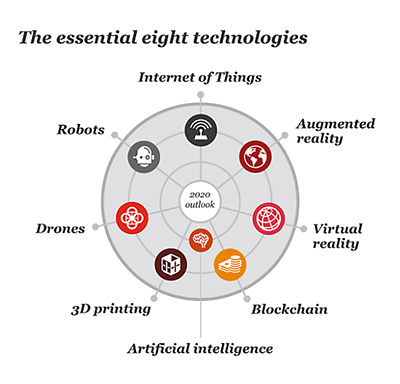Eight technologies essential for business to understand – PwC
TECHNOLOGICAL change is happening as such a pace that business leaders can rarely keep pace – yet they must do so in order to make vital decisions on company futures.
Global advisory firm PwC has prepared a report on the ‘megatrends’ of technological breakthroughs and identified eight essential aspects business leaders must get their head around.
For its report, Tech breakthroughs megatrend, PwC evaluated more than 150 technologies globally and developed a methodology for identifying those which were most pertinent to individual companies and whole industries. 
The result is a guide to the ‘Essential Eight’ technologies PwC advisors believe will be the most influential on businesses worldwide in the very near future: artificial intelligence, augmented reality, blockchain, drones, the internet of things (IoT), robots, virtual reality and 3D printing.
The specific technologies that will have the biggest impact on each industry will vary, but PwC believes the list of eight comprises technologies with the most cross-industry and global impact over the coming years.
To arrive at the Essential Eight, PwC filtered technologies based on business impact and commercial viability over the next five to seven years – shortened to three-to-five years in developed economies.
The specific criteria included a technology’s relevance to companies and industries; global reach; technical viability, including the potential to become mainstream; market size and growth potential; and the pace of public and private investment.
“Most companies have laid a foundation for emerging technology, investing in areas such as social, mobile, analytics and cloud,” PwC’s global new business leader, Vicki Huff Eckert said.
“Now it’s time for executives to take a broader view of more advanced technologies that will have a greater impact on the business.”
NEXT BIG THING
Ms Huff Eckert said companies continually waited for the “next big thing,” believing that a particular technology trend either would not amount to much, or that it would not affect their industries for years to come.
However, she said, disruption is happening today at a faster rate and higher volume than ever before.
“Innovations throughout history have tipped the balance in favour of the innovators. In that sense, technological breakthroughs are the original megatrend,” she said.
“The ubiquity of technology, with increased accessibility, reach, depth, and impact are what will expedite adoption of the Essential Eight.”
PwC believes the Essential Eight technologies will shake up companies’ business models in both beneficial and quite challenging ways. Across industries and regions, the emerging technology megatrend will influence strategy, customer engagement, operations and compliance.
As a result, the report outlines, leadership teams should find effective answers to three fundamental questions:
Do we have a sustainable innovation strategy and process?
Have we quantified the impact of new technologies? If not, how can we do that—and how soon?
Do we have an emerging-technologies road map? If so, are we keeping it up to date?
According to PwC’s report, executives should not treat the Essential Eight technologies as a sort of checklist to delegate to the chief information officer (CIO) or chief technology officer (CTO).
Rather, exploring and quantifying emerging technologies — and planning for them — should be a core part of a company’s corporate strategy, involving all levels.
Ms Ms Huff Eckert said before developing an innovation strategy and exploring and quantifying emerging technologies, executives “should educate – or re-familiarise – themselves with these technologies and what they can do”.
ends

 How to resolve AdBlock issue?
How to resolve AdBlock issue?